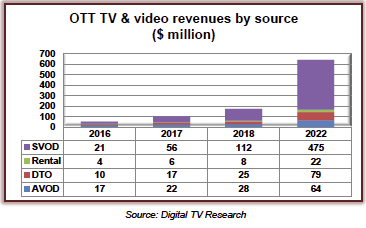
After more than 40 years of operation, DTVE is closing its doors and our website will no longer be updated daily. Thank you for all of your support.
Mobile key for African OTT growth – study
 Mobile distribution will be the overriding factor in the take up of OTT television services in Sub-Saharan Africa, Digital TV Research has forecast.
Mobile distribution will be the overriding factor in the take up of OTT television services in Sub-Saharan Africa, Digital TV Research has forecast.
With the number of fixed broadband homes only expected to reach 13 million by 2022, the estimated 486 million smartphones users in the region will be the key demographic for operators.
“It is very important to stress the power that mobile operators have over the future of Sub-Saharan African OTT TV and video,” said Digital TV Research principal analyst Simon Murray.
SVOD is already the main revenue driver for OTT TV and video in Sub-Saharan Africa, the new data shows.
While they were just US$22 million, they are set for exponential growth by 2022, when they are predicted to reach US$475 million.
In total, there will be an estimated 10.12 million SVOD customers, up from 525,000 at end-2016. South Africa will contribute 2.7 million of these, followed by Nigeria with 2.64 million.
Advertising-funded VOD will also experience a boom, up from US$17 million in 2016 to US$64 million, while download-to-own will grow from US$10 million to US$79 million. Rental revenues will also grow multiple times.
“The mobile operators know that they are in a powerful position. Not only can they give OTT players access to their extensive subscriber pools, but they can also conduct the billing (thus foregoing the need for SVOD platforms to insist on credit card payments).
“Most importantly, many mobile operators currently charge high data prices for OTT access – which can add considerable costs to subscribers. However, a distribution deal with a mobile operator can substantially cut these costs.”
Revenues from TV and movies will reach US$640 million in the region by 2022, which is up twelve times on the US$52 million figure Digital TV Research quoted in its study.
South Africa will account for 40% of regional revenues, with Nigeria bringing in 22%.


